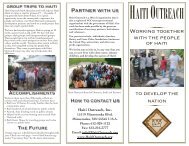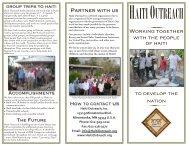hai5249 annual report.rd4 - Haiti Outreach
hai5249 annual report.rd4 - Haiti Outreach
hai5249 annual report.rd4 - Haiti Outreach
You also want an ePaper? Increase the reach of your titles
YUMPU automatically turns print PDFs into web optimized ePapers that Google loves.
THE COMMUNITY WATER COMMITTEE<br />
STANDS IN FRONT OF THE NEW WELL IN<br />
THE RURAL COMMUNITY OF PUITS DE LABY<br />
Children pumping clean water from a<br />
new well built as part of the safe<br />
water plus program<br />
Collaborating with World Vision and the<br />
Minnesota Rotary<br />
In 2002, <strong>Haiti</strong> <strong>Outreach</strong> and the Minnesota Rotary were essentially<br />
unaware of each other. But in a remarkably serendipitous event some<br />
might say was divinely guided, these neighbors were brought together by<br />
an international relief and development organization: World Vision. All<br />
three organizations share an interest in bringing clean water to third world<br />
countries.<br />
<strong>Haiti</strong> <strong>Outreach</strong>, Minnesota Rotary District #5950 (since joined by #5960)<br />
and World Vision have now completed the first year of a three-year<br />
contract to drill 75 new wells and rehabilitate 66 water systems in some of<br />
the most isolated parts of <strong>Haiti</strong>. When completed, this project is expected to<br />
bring clean water to an estimated 42,000 people.<br />
Here’s how our collaboration came about. The Minnesota Rotary had<br />
pledged $1 million to the organization that would most effectively develop<br />
water resources in a poor country. Because of our past work together on<br />
well and road projects, World Vision contacted <strong>Haiti</strong> <strong>Outreach</strong> late in 2002<br />
to work out a joint submission, called the <strong>Haiti</strong> Safe Water Plus Project.<br />
World Vision was awarded the grant, subcontracting much of the work to<br />
<strong>Haiti</strong> <strong>Outreach</strong> as planned.<br />
The amazing coincidence is that <strong>Haiti</strong> <strong>Outreach</strong> and the Minnesota Rotary<br />
are literally in each other’s backyard – both are based in Minneapolis. Since<br />
discovering each other, we have been in frequent communication about this<br />
and other potential projects. Rotarians are traveling with us to <strong>Haiti</strong> to see<br />
the work and conditions firsthand.<br />
Partnership among non-governmental organizations is a growing trend in<br />
third-world development, as each organization contributes its particular<br />
expertise toward more successful projects. <strong>Haiti</strong> <strong>Outreach</strong> has been<br />
partnering like this since our first project, the Bohoc water system, in 1998.<br />
Our flood relief work in Gonaives is another example. We expect this<br />
cooperation will continue and expand in our future work.<br />
Clean water in the wake of deadly floods in Gonaives<br />
The torrential rains of Hurricane Jeanne in mid-September and <strong>Haiti</strong>’s extreme deforestation combined for a devastating flood that<br />
affected over 100,000 people in and around the city of Gonaives. It swept over 2,000 people to their death. It damaged or destroyed 75% of<br />
the housing. And it put the city water system out of commission by damaging pipes and destroying two large pumps. Without city water,<br />
people drank the muddy flood waters to survive.<br />
<strong>Haiti</strong> <strong>Outreach</strong> immediately sent its water truck, normally used in well-drilling operations, to haul in 150,000 gallons of clean water over<br />
the next two months. In addition, <strong>Haiti</strong> <strong>Outreach</strong> Country Director Neil Van Dine offered his assistance to the <strong>Haiti</strong>an government's<br />
potable water department.<br />
As a result, a collaboration of four organizations – <strong>Haiti</strong> <strong>Outreach</strong>, OXFAM, IOM<br />
(International Organization for Migration) and the Canadian government –<br />
engaged in a $150,000 project to get the city water system back online.<br />
Neil researched possible solutions, and came up with specifications for new pumps.<br />
He selected two 60hp submersible pumps capable of delivering over 1,000 gpm<br />
each into the city water system, at a cost of about $18,000 US each. IOM and<br />
OXFAM provided funding to buy the pumps at a reduced cost from a dealer in<br />
California. They were shipped in aboard MFI airlines, along with replacement<br />
valves for the city water lines. The timing was tight: the last of the boxes for the<br />
pumps came into Cap <strong>Haiti</strong>an the same day the installers flew into Port au Prince.<br />
Jim Kirzeder, Ronald Ringhand and Neil Van Dine spent the next 10 days<br />
installing the pumps and sorting out the antiquated electrical system feeding the<br />
pumps, which Hydro-Quebec International helped repair. They finished the<br />
project on January 26, 2005, with the water system pumping over a million gallons<br />
the first day.<br />
Debris fills the streets of gonaives as flood<br />
water recedes<br />
A growing presence in <strong>Haiti</strong><br />
Proud to be a local employer<br />
<strong>Haiti</strong> <strong>Outreach</strong> is proud of our 15 hardworking employees – 13<br />
of them <strong>Haiti</strong>an – who manage the organization, do the<br />
community development work, drill the wells, do the<br />
accounting, repair our vehicles and perform many other jobs.<br />
Below we highlight two of them:<br />
Country Director<br />
Neil Van Dine<br />
Words cannot<br />
describe the amount<br />
of commitment,<br />
creativity and drive<br />
Neil Van Dine<br />
possesses. Our guiding model of sustainable community<br />
development was derived from Neil’s years of grassroots<br />
experience in <strong>Haiti</strong>.<br />
Neil’s commitment to the <strong>Haiti</strong>an people began when he first<br />
visited there at 19. At age 23 in 1989, he moved to <strong>Haiti</strong><br />
permanently and built his own small home with no running<br />
water and only a backyard latrine. He knew that if he was to<br />
earn the respect and attention of the <strong>Haiti</strong>an people, he had to<br />
live as they did.<br />
Neil started with <strong>Haiti</strong> <strong>Outreach</strong> in 1997. Before that, he drilled<br />
wells for philanthropist Jay Lawhon, started a handyman school<br />
and worked for the International Office of Migration. In all the<br />
years Neil has been in <strong>Haiti</strong>, he estimates he has participated in<br />
the digging of wells or creation of water systems affecting<br />
300,000 people.<br />
With his wife Mizou, Neil lives near the town of Pignon and has<br />
three children: Venans, Ken and Lauren. Neil runs the entire<br />
operation of <strong>Haiti</strong> <strong>Outreach</strong> in <strong>Haiti</strong>, and we are privileged to<br />
have his tireless leadership.<br />
Project Supervisor<br />
Roge Michel<br />
Five years ago, Roge<br />
Michel was the second<br />
employee to join <strong>Haiti</strong><br />
<strong>Outreach</strong>. Hired as an<br />
“animator,” the<br />
<strong>Haiti</strong>an term for project coordinator, Roge soon earned more<br />
responsibility as a project supervisor. Roge has training in<br />
agriculture, communications and community development. In<br />
the 1990s, he worked with Neil at ADRA (Adventist<br />
Development and Relief Association). When ADRA closed its<br />
operation in <strong>Haiti</strong>, Neil hired Roge. Ever since, he has managed<br />
projects and developed community work with great skill.<br />
Roge has seen many improvements achieved by our work in <strong>Haiti</strong>:<br />
improvements in people’s wealth, school attendance and quality of<br />
homes. Most importantly, he sees communities organizing<br />
themselves and individuals taking greater responsibility for their<br />
own lives and their communities. He even believes there is less<br />
crime when communities are more active.<br />
At 42, Roge lives in the town of Hinche with his wife Muliette and<br />
their daughter Rossinie (13) and son Roggery (5). In his spare time,<br />
he enjoys music, soccer and watching videos. He is pleased to<br />
work for <strong>Haiti</strong> <strong>Outreach</strong>, and we are happy to have such a<br />
talented and hardworking man so committed to developing<br />
communities.<br />
Answering a long-awaited call for<br />
a building<br />
In 2003, it became apparent that the growth of our community<br />
development work required an increasing number of vehicles and<br />
personnel. We had been operating out of Neil Van Dine’s home<br />
and storage building, which he and his family graciously allowed.<br />
It was long past time for us to let the Van Dines enjoy the privacy<br />
of their own home and yard.<br />
<strong>Haiti</strong> <strong>Outreach</strong> purchased some land near the Pignon airport and,<br />
early in 2004, started to erect a building that should serve us for<br />
many years. In the spring, board member Jim Kirzeder led a<br />
Minnesota construction crew that worked alongside <strong>Haiti</strong>ans to<br />
complete the basic work on the structure, including the difficult<br />
job of putting on the roof. We dug a well and built a separate<br />
small building to house the diesel-powered electrical generator.<br />
The new building has four major uses:<br />
• Storage for equipment and vehicle parts<br />
• Vehicle repair in a large open area<br />
• Office<br />
• Classroom space for a future technical school<br />
We designed the building to allow for a second floor to be added<br />
in the future, when the need arose. By the end of 2004, that need<br />
was already clear. The space will be used for the offices of the<br />
<strong>Haiti</strong>an microlending bank Fonkoze.<br />
The headquarters has already proven extremely useful to the<br />
operations of <strong>Haiti</strong> <strong>Outreach</strong>. It allows us to operate much more<br />
efficiently as we carry out our mission.






